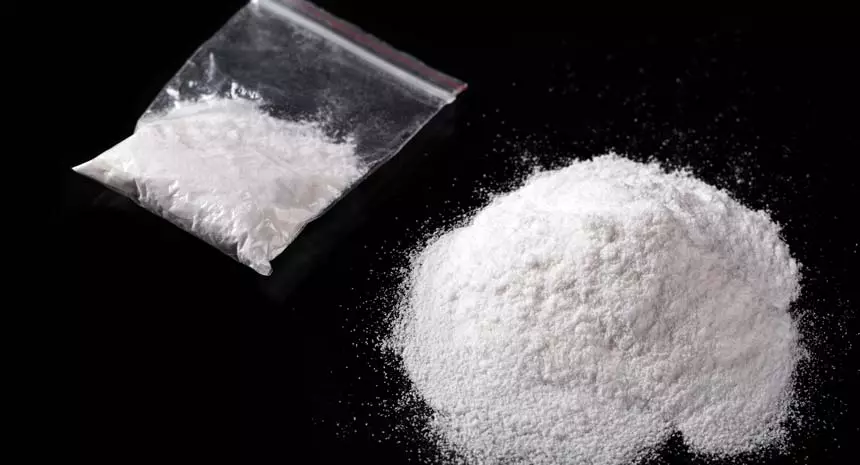What is Cocaine?
Table of Contents
- What is Cocaine?
- A Few Cocaine Basics
- Understanding Cocaine Addiction and Abuse
- What is a Cocaine Binge?
- The Side Effects of a Cocaine Binge
- What is a Cocaine Comedown?
- Cocaine Hangover Tips
- Cocaine Withdrawal & Symptoms
- Cocaine Addiction Treatment Options
- Get the Right Treatment Options for Cocaine Withdrawal Today
- FAQs on Cocaine Withdrawal and Comedown:
- Medically Reviewed By
Cocaine is an illegal stimulant drug derived from coca plant leaves, which is native to South America. These leaves are then processed several times, usually in combination with various toxic chemicals (such as kerosene or acetone), until all that is left is a cocaine paste base.
From there, it is usually trafficked to Mexico and into the US, where cutting agents reduce its purity and make it ready for sale on the street.
You may already know all this since you’re looking for a resource on the cocaine comedown and how to reduce or eliminate its effects.
Keep reading to find out more about ways to reduce the negative effects of cocaine, and how to find lasting relief through various forms of treatment!
A Few Cocaine Basics
Cocaine is currently classified as a Schedule II drug under the Controlled Substances Act.
This means that this drug has acknowledged medicinal properties, but is considered to be highly addictive. Although cocaine is rarely ever used in a medical context today, it was once administered as a solution called cocaine hydrochloride as a topical anesthetic.
More commonly found as a street drug today, cocaine, a.k.a coke, can be found as a white crystalline powder, which may be referred to by several other names, including, “Snow,” “Nose Candy,” “Mojo,” “Dust,” “Coke,” “Crack,” and “Blow,” amongst others.
It is also quite common for street dealers to cut this drug with other substances such as inositol, baking soda, and talcum powder. This allows them to maintain their drug supply longer, while still profiting off of their clientele.
Understanding Cocaine Addiction and Abuse
When using cocaine, those taking the drug will usually experience intense euphoric feelings, along with a heightened sense of confidence. However, cocaine is a fast-acting drug, which can make people want to prolong its effects by increasing the amount they take, or using more often.
With prolonged drug abuse, cocaine alters the central nervous system, causing dopamine levels in the brain to progressively increase over time. This means that, the longer cocaine is abused, the harder it is for their brain to release dopamine naturally.
Cocaine belongs to a class of drugs called stimulants, which means that it produces feelings of increased energy, happiness, and excitement when consumed. This can be attributed to the increased levels of dopamine in the brain.
With this high, however, there also comes a nasty cocaine crash. After all, this is one of the quickest drugs to exit the system. That means that the high does not last very long, ranging from anywhere between 30 minutes to an hour in length.
However, the longer the high, the worse the cocaine crash afterwards. Unfortunately, many users are willing to take the risk of addiction and negative after-effects in order to prolong or intensify their high, leading them to go on a cocaine binge.
This, however, can be extremely dangerous, not only leading to a severe drug addiction, but a number of unpleasant and potentially life-threatening health effects. So what exactly is a cocaine binge?
What is a Cocaine Binge?
A drug binge refers to the act of taking large quantities of a drug at a singular time. While most users may typically take around a quarter-gram of cocaine in total, more heavy users often consume several grams of this highly addictive drug in a shorter period of time.
Taking large amounts of cocaine regularly will not only cause you to develop a physical dependence on the drug more quickly, but will have extreme negative consequences on your physical and emotional health.
The Side Effects of a Cocaine Binge
The effects of cocaine will set in quickly, as it travels to the brain faster than most stimulant drugs. Someone who has gone on a cocaine binge will likely experience a number of side effects, including:
- Panic attacks
- Lack of sleep
- Increased irritability
- Restlessness
- Intense paranoia
- Delusions and paranoia
- Hallucinations
- Psychosis
- Chest and heart palpitations
- And of course, the cocaine comedown
What is a Cocaine Comedown?
While the effects of a cocaine high may seem enjoyable, the comedown period, or “cocaine hangover” that occurs afterwards most certainly is not. A cocaine comedown may cause side effects that serve as the opposite of those experienced during a high.
This, in turn, may cause people to continue binging more cocaine, so as to avoid the unpleasant coke comedown and its physical and emotional aftereffects. Unfortunately, this may cause them to experience a cocaine overdose, which can be life-threatening if not properly addressed.
Some of the comedown symptoms that may be experienced when recovering from cocaine binges include flu-like symptoms, as well as:
- Depression
- Physical slowness or sluggishness
- Foggy thinking
- Exhaustion
- Trouble sleeping
- Aches and pains
Because the psychological and physical symptoms of a cocaine comedown can be so intense, many people will resort to taking more cocaine in order to preserve its stimulating effects. This will usually be a larger amount than their first dose, so as to enhance the high.
However, as discussed, this increased cocaine abuse can lead to a dangerous overdose, producing side effects such as:
- Enlarged pupils
- Intense sweating
- Labored breathing
- High body temperature
- Clammy skin
- Loss of color
- Convulsions
- Twitches or tremors
- Chest pain
- Numbing in the arms
- Unconsciousness
- Dry mouth
- Respiratory depression
During a cocaine overdose, heart rate and blood pressure spike. If help is not sought immediately, these levels can become high enough to lead to additional complications. It is important to be aware of other cocaine overdose signs so you can get help before it’s too late.
Cocaine Hangover Tips
A cocaine hangover, whether brought on by taking too much cocaine or mixing this substance with more drugs, can be managed to make the effects less intense. This can help stave off the urge to take more cocaine as the drug wears off, and prevent a rebound effect while sobering.
When you are recovering from a cocaine comedown, it is important that you are staying hydrated and well nourished as the drug wears off. This means that you should:
- Drink plenty of water
- Eat a healthy meal
- Get extra rest
- Be gentle with yourself
- Take vitamins
- Avoid other harmful or addictive substances
The effects of a cocaine crash can be mentally, physically, and emotionally draining. That is why your best bet for recovering from your cocaine use is to make sure you are engaging in healthy and supportive activities, and avoiding this drug altogether.
Cocaine Withdrawal & Symptoms
Some of the physical and psychological symptoms of a cocaine comedown can mimic those of cocaine withdrawal, although these are two very different things. Anyone can experience a cocaine comedown, even first time users. Withdrawal, however, comes with addiction.
Once your body has become dependent upon this drug, attempting to drastically reduce or completely stop your cocaine use can have severe impacts on your well-being. This is because the body will no longer be able to function without the drug.
Some of the symptoms that may be experienced when you are going through cocaine comedown and prolonged withdrawal may include:
- Extreme depression.
- Suicidal thoughts.
- Drug cravings.
- Agitation or restlessness.
- Fatigue or exhaustion.
- General physical discomfort.
- Increased appetite and binge eating.
- Mood swings.
- Unpleasant or vivid dreams, nightmares, or other sleep disturbances.
- Slowing of physical and mental activity.
- Runny nose.
Cocaine Addiction Treatment Options
There are several addiction treatment centers and programs that offer specially-designed recovery resources to help cocaine users stop their drug habit for good. In many cases, a combination of medical and behavioral treatments is the most effective in treating this addiction.
Medical Detox for Cocaine Addiction
Most people will begin their cocaine recovery journey by participating in a medical detox process, so that their system can be gradually weaned off of cocaine (and any other drugs you may be using). While remaining under medical supervision, you may also be prescribed medications that help manage your withdrawal symptoms.
This will typically be followed by seeking help at an inpatient treatment center or outpatient treatment program, depending on the severity of your addiction and other financial and time factors. Your treatment plan may also include your participation in several behavioral therapies.
These therapeutic services can help address any underlying mental health issues that may be influencing your use of cocaine. One example of this is Cognitive Behavioral Therapy (CBT), which helps you learn to recognize your feelings and build better coping mechanisms for them.
Get the Right Treatment Options for Cocaine Withdrawal Today
If you or a loved one is frequently experiencing cocaine comedowns and are worried you may be addicted, know that you are not alone, and help is available. At Find Addiction Rehabs, we help people find addiction treatment center options nationwide on a daily basis.
Our recovery representatives can help you find the right match for rehab, one that can help address all of your unique needs and history. No matter your home state, relapse history, or type of insurance coverage, we are here for you.
Call our 24/7 hotline now, and one of our representatives can help get you started on a path to a happier and healthier way of living today!
FAQs on Cocaine Withdrawal and Comedown:
Q: What is the Cocaine Comedown Timeline?
While there is no exact cocaine comedown timeline, this period can last anywhere between a few hours to the rest of the day, depending on how much cocaine you took and how regularly you take this drug.
Furthermore, if you are struggling with any underlying mental or physical health conditions, your cocaine use may further exacerbate these issues and increase the duration of your comedown period.
Q: How Can I Overcome Cocaine Comedown Symptoms?
Overall, recovering from a cocaine binge and crash will take time, and having a proper support system and coping mechanisms in place is essential for preventing severe side effects and habit-forming behaviors.
The best method for avoiding this cocaine crash is simply just to not use the drug at all. If you or a loved one is struggling with cocaine abuse and are having a hard time quitting on your own, Find Addiction Rehabs representatives are happy to help you find recovery solutions that work for you, anytime you need them.
Bryan was born in Philadelphia and remains an ardent supporter of Philadelphia sports. After attending FSU and FAU where he majored in writing, Bryan ventured out to follow in the footsteps of his idols, running straight into drug addiction. After being arrested by the President’s Secret Service, Bryan finally started to rebuild his life and beat that monkey off of his back through writing, playing music, and studying Buddhist philosophy.
Despite still having the occasional struggles with mental health, Bryan strives to be a little bit better a person each day. With the support and love from a loyal family, and kind-hearted and generous friends, Bryan tries to help people vanquish their own personal demons as he did and bring more love and beauty into a pessimistic world.





